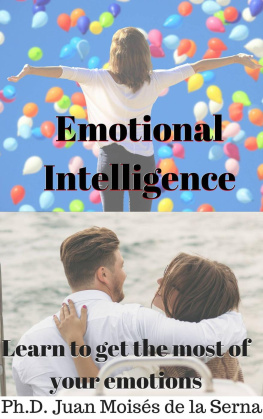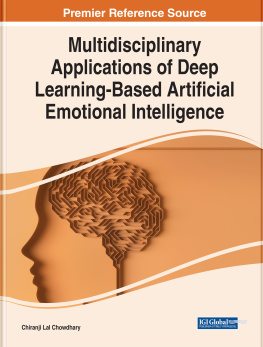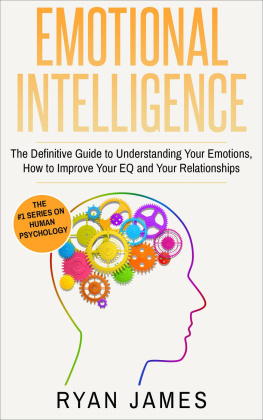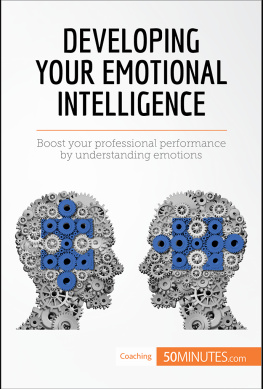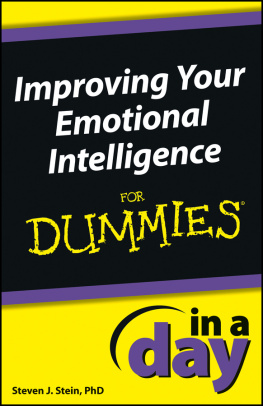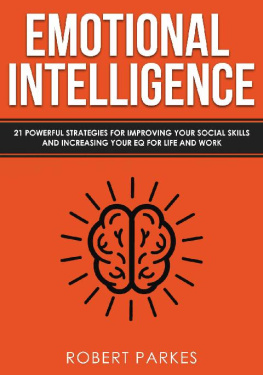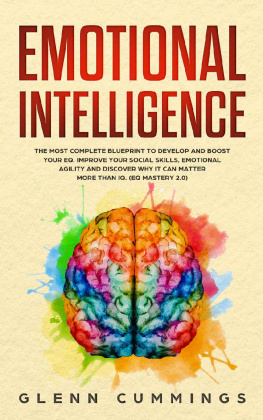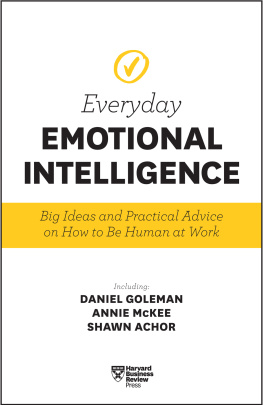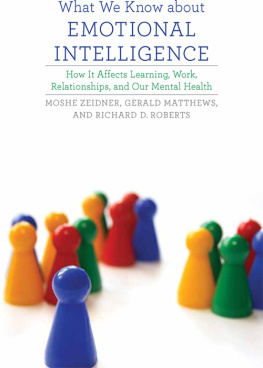Emotional Intelligence: Learn to get the most of your emotions
Juan Moises de la Serna
Translated by Alexandra Jimenez
Emotional Intelligence: Learn to get the most of your emotions
Written By Juan Moises de la Serna
Copyright 2017 Juan Moises de la Serna
All rights reserved
Distributed by Babelcube, Inc.
www.babelcube.com
Translated by Alexandra Jimenez
Babelcube Books and Babelcube are trademarks of Babelcube Inc.
Emotional
Intelligence
Learn to get the most of your emotions
Ph.D. Juan Moiss de la Serna
Copyright 2017
PROLOGUE
If theres something that has been talked about in the recent years in the field of Psychology it has been about E.I. (Emotional Intelligence), at the beginning it was as a development of the studies regarding human emotions and its implications in life, to later on acquire an important role in important fields like education and business, and all this thanks to the benefits that have been observed that causes both in performance and life satisfaction for who cultivates E.I.
This eBook offers an approximation to the latest research in the field of E.I., where you get an approach to both its definition and consequences, but above all how this can be applied to everyday life to get the most benefits out of it.
A necessary path, developing E.I. that will be seen as indispensable once youre done reading this eBook.
INDEX
Dedicated to my parents.
SPECIAL THANKS
I will like to thank all of the people that have supported with their contributions of this book, especially the Government of Canarias, to Dr. Jaci Molins Roca, Graduate director of personal and institutional coaching of the Rovir i Vigili University and to D. Bruno Moili Montenegro, Expert-Trainer on Emotional Intelligence.
Chapter 1. Defining Emotional Intelligence
Y ou can say that you live in an emotional world, just as you can say that we live in a social world. Meaning that people that control their emotional development, are also the most successful. For example, a salesman of any product or service, he works mainly in selling emotions, so that someone else buys or gets what hes offering.
Media, TV, radio, or any other, try to excite, and with that sell more products or services; but not every person has the same level of emotional control, there are some people that for some reason dont get to develop it enough, thats why from some years onward a new field of research and work in psychology has been created, called E.I. (Emotional Intelligence) started by Daniel Goleman with his book of the same title.
If we look into the Google search results, about the search trends of Emotional Intelligence, in its different concepts around the world from 2004 to 2017, you can see that the most worried country about it is Peru, followed by Honduras and Guatemala; leaving Spain in 21st place, and the United States in the 45th position of seventy-six countries that make up the Google search results, Japan occupying the last position.
Its necessary to highlight that in the first twenty spots that search this term, sixteen are Latin American.
Its also necessary to mention that globally there has been an important fall in the use of this term through the years, leaving it in 2012 under the 30% of the searches that were made in 2004, to later on increase progressively until our days.
We have to take in consideration that intelligence has been defined traditionally as the capability of resolution of standardized tests for the target population determined by genetics.
This means, that the test has been validated with several samples before giving to the general population, and it has both internal and external validation, meaning, it measures what is supposed to measure, and its also specifically designed for a determined collective and age range.
<> D. Bruno Moioli Montenegro, Expert-Trainer on E.I.
The use of intelligence questionnaires started in the 19th century, there have been lots of opposition to this tests considering it unfair trying to evaluate the entire population by the same standards.
At the beginning of the previous century there was lots of controversy because of the studies that have been done by the armed forces that studied the relationship between intelligence and race, meaning, they analyzed the results of the American population and if it was black or white, and between native American population and immigrants, concluding that whites, of Anglo-Saxon ancestry, had the best results than another racial group; they also had better results compared to immigrants whose native language wasnt English. All that motivated education policies to make up for those differences.
Later studies left evidence of the failures of the tests used, which didnt have the terminology used by the target population that was to be analyzed, meaning that the defects of determined populations were more a lack of understanding what was asked because of the test than lack of ability or knowledge that was to be tested, that lead to adapting the test to who it was meant to be tested.
Nevertheless, the IQ (or Intelligence Coefficient) is still a valid measure for the capability of a solution of a series of tests designed and prepared by psychologists, that follow strict norms of control established by the psychometrics ( the science of measurement) so that the results are valid and trustworthy of the population tested.
Thanks to this, academic success can be predicted, and with that, also the professional future for students, before they can even be conscious of their skills and possibilities; its also used in the field of recruitment to find the ideal candidate for each position, that doesnt need to be the best qualified or the most experienced.
Through the years the psychometrics have been perfected so that it is highly trusted, that is why companies decided their future based on the results of the tests done by the Human Resources services.
As it has been said until now, evaluating intelligence is a controversial subject, both by its definition and how it is socially applied. There are many that say that there is a single intelligence, meaning you are either intelligent or youre not, and if you are, you are like the rest, you underneath the average or above of it. If you fall in the last case you may be smarter than the rest, a gifted person or a genius, which are apart by different grades. That will be the case if we were still using the classic model of intelligence, not used anymore.
In the last decades, the concept of intelligence has been questioned, understanding that its not a unit, but that there are multiple intelligences: spatial intelligence, verbal intelligence, mathematical intelligence, musical intelligence, etc.
A person with highly developed capabilities for music will be a great Chopin or Mozart today, but might not be able to stand out when working on integrals, derivatives, or trigonometry, for example.
Another different thing is that the genius, capable of standing out in various intelligence areas; though currently theres no existing scientific consensus to clearly establish this distinction.
Another aspect is the social implications of the gifted people, feared by some or disregarded by others; some countries have years investing efforts through population screenings, meaning, intelligence questionnaires distributed in all the schools to find these potential geniuses.
Next page
